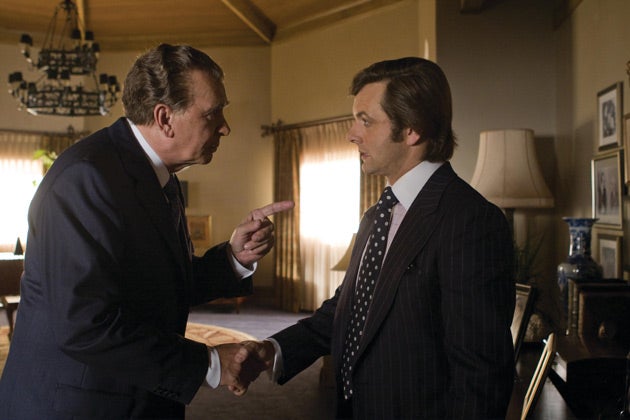Your support helps us to tell the story
From reproductive rights to climate change to Big Tech, The Independent is on the ground when the story is developing. Whether it's investigating the financials of Elon Musk's pro-Trump PAC or producing our latest documentary, 'The A Word', which shines a light on the American women fighting for reproductive rights, we know how important it is to parse out the facts from the messaging.
At such a critical moment in US history, we need reporters on the ground. Your donation allows us to keep sending journalists to speak to both sides of the story.
The Independent is trusted by Americans across the entire political spectrum. And unlike many other quality news outlets, we choose not to lock Americans out of our reporting and analysis with paywalls. We believe quality journalism should be available to everyone, paid for by those who can afford it.
Your support makes all the difference.The atmosphere of Frost/Nixon is so heavy with self-importance that you'd be forgiven for thinking that, in it, the very fate of Western politics hangs in the balance. Ron Howard and Peter Morgan have opened up the latter's stage play to embrace a world of ritzy hotels and stretch limos, but he has kept the quasi-documentary build-up to persuade us that what we're to witness is a duel as legendary as David and Goliath, and as enthralling as Ali versus Foreman. And the prize at stake in this momentous encounter? An apology on TV from a disgraced politician. Pardon me if I'm underwhelmed.
And how that build-up lasts! From the moment that David Frost (Michael Sheen) reveals to his friend John Birt (Matthew Macfadyen) that he wants to stage a series of TV interviews with former US President Richard Nixon (Frank Langella), the film pitches into an interminable round of back-room preparations, arguments, and debates, with each side setting out what it hopes to achieve. For Nixon, it's a chance for political rehab after three years fleeing the shadows of Vietnam and Watergate. For Frost's team, it's the opportunity to bring Nixon to public account, to a confession of wrongdoing after years of denial. For Frost himself, it's something different again: he wants to revive his flagging TV career ("Think of the numbers we'd get"), and prove to the world what a star he is.
The first hour becomes almost entirely exposition; information is repeated, scenes recapitulate one another, battle plans are drawn and redrawn – "No holds barred", says Nixon of the coming bout, no fewer than four times. At one point a title card indicates on screen – "55 Days Before The Interview" – and you can't help groaning: for heaven's sake, how much fanfare does a TV show need?
Once the interviews themselves get underway, Frost/Nixon at last begins to involve us, and the two actors do their best work. Langella doesn't quite nail Nixon's voice (more like John Huston's) but he gets those sudden shifts of temper just right: here is the angry, paranoid, self-pitying and rather sinister fellow one hears on those famous White House tapes, an operator with a small supply of charm and an unlimited interest in money. When Nixon meets Frost's girlfriend Caroline (Rebecca Hall – woefully under-used) he advises Frost to marry her, mainly because she's a resident of Monaco ("they pay no taxes there").
Sheen, flashing the Cheshire Cat grin and wearing that lacquered 1970s hair like a helmet, catches a different sort of operator in Frost, exuding the nervous tension of a man with his reputation – and most of his money – on the line. The interviews are cast as a prize-fight, with subject and inquisitor circling, feinting and dodging under the camera lights, while outside the ring their cornermen gaze on, totting up the points.
Yet one feels nagged all the way by its self-proclaimed momentousness. Yes, it must have seemed quite something when Nixon finally stumbled through his mea culpa, but the reverence surrounding the moment is absurdly misplaced. He had already been caught; the postscript of a confession was secured, but that's all it was – a postscript.
The film wants to make a hero, not only of Frost, but of television itself, the medium that exposes hypocrisy and corruption within the body politic. Only here it hadn't: Nixon had already been impeached and discredited. The film's most intriguing point comes at the end, when Nixon admits his real shortcoming – an inability to be liked – and suggests that Frost, who wore amiability as his armour, might have made the better politician. This quicksilver showman instinctively grasped the power of television. That was clever of him, but was it something to be proud of?

Join our commenting forum
Join thought-provoking conversations, follow other Independent readers and see their replies
Comments